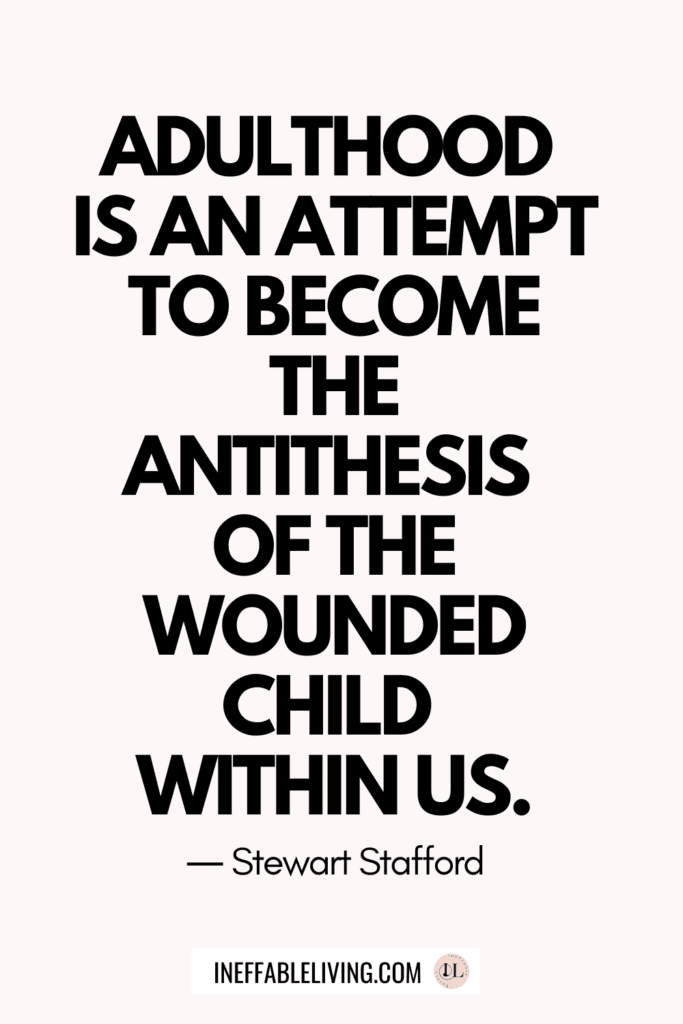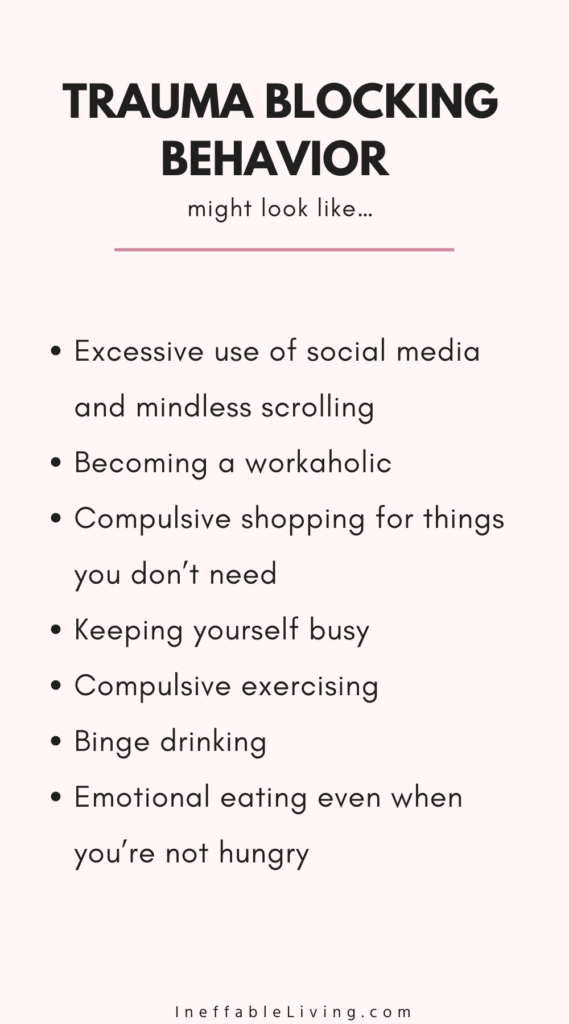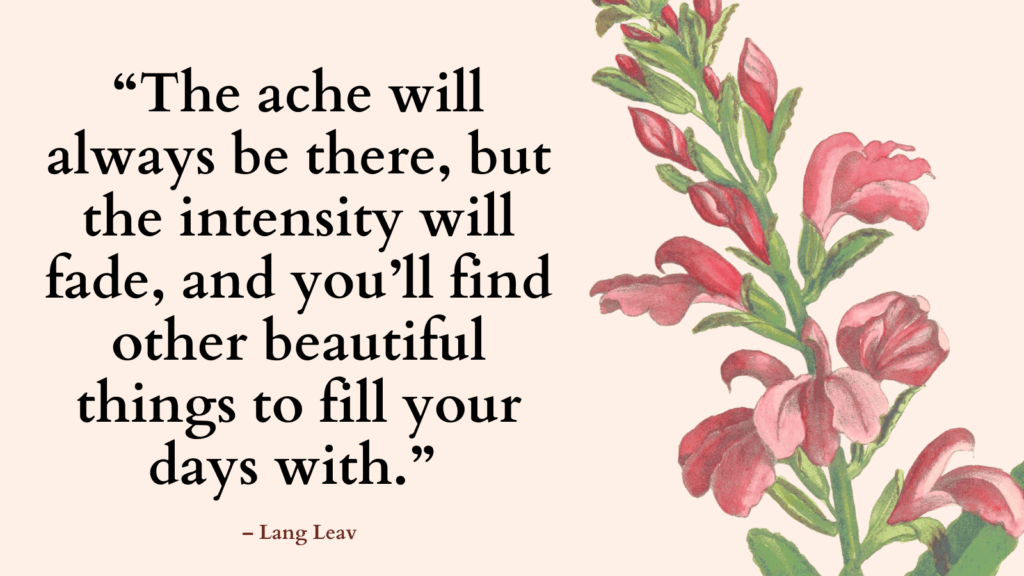This post contains best quotes about adverse childhood experiences that will make you feel seen.
What Are Adverse Childhood Experiences?
The Adverse Childhood Experiences (ACEs) Study was conducted by two medical doctors, Vincent Felitti, head of Kaiser Permanente’s Department of Preventive Medicine in San Diego, California, and Robert Anda, a Centers for Disease Control and Prevention researcher (Felitti 2002).
The study analyzed the medical records of more than 17,000 patients at a large health maintenance organization. The results show that ten commonly reported ACEs predict a very wide range of psychological and physical problems. The ten ACEs are:
Three kinds of abuse
- Sexual
- Physical
- Emotional
Two kinds of neglect
- Emotional
- Physical
Related: Healing From Childhood Emotional Neglect In 6 Steps (+FREE Worksheets PDF)
Five kinds of household dysfunction
- Parents divorced or separated
- Witnessing a mother or stepmother being treated violently
- A household member addicted to alcohol or other drugs
- A household member suicidal or mentally ill
- A household member in jail
Felitti and Anda (2014) found that about two-thirds of adults had experienced at least one of these adversities early in life.
Adverse childhood experiences trigger toxic stress.
This is the kind of stress that is intense and chronic, so much so that the body doesn’t return to normal.
Psychologists have called is type of stress, dysregulated stress.
Related: Take The Childhood Trauma Test (ACE Score Test)
Quotes About Adverse Childhood Experiences
1. “A controlled child also learns that the default human approach to interaction is forcing, threatening, or manipulating others. Alternatively, they may come to believe that they are “destined” to be a giver who never receives anything back.” ― Darius Cikanavicius
2. “Abuse is never deserved, it is an exploitation of innocence and physical disadvantage, which is perceived as an opportunity by the abuser.” ― Lorraine Nilon
3. “Adulthood is an attempt to become the antithesis of the wounded child within us.” ― Stewart Stafford
4. “Another step is that daughters can learn to monitor their own feelings and instincts by saying, “I feel uncomfortable (angry, dominated, usurped, inadequate, guilty, furious) with my mother more often than I do not. I have to pay attention to that, because it shows in how I treat my friends (lover, spouse, kids, colleagues). There is validity here. I don’t have to blame or excuse my mother-I just have to see her so I can see myself.” ― Victoria Secunda
5. “Childhood trauma does not come in one single package.” ― Asa Don Brown
6. “Children grow up wounded due to someone’s emotional recklessness. We become adults who stay longer than they should, in relationships that offer very little in return.” ― Elelwani Anita Ravhuhali
7. “Dissociation is the common response of children to repetitive, overwhelming trauma and holds the untenable knowledge out of awareness. The losses and the emotions engendered by the assaults on soul and body cannot, however be held indefinitely. In the absence of effective restorative experiences, the reactions to trauma will find expression. As the child gets older, he will turn the rage in upon himself or act it out on others, else it all will turn into madness.” ― Judith Spencer
8. “Emotional abuse can leave a victim feeling like a shell of a person, separated from the true essence of who they naturally are. It also leads to a victim feeling tormented and tortured by their own emotions.” ― Lorraine Nilon

9. “Experience has taught us that we have only one enduring weapon in our struggle against mental illness: the emotional discovery and emotional acceptance of the truth in the individual and unique history of our childhood.” ― Alice Miller
10. “For those of us who haven’t been taught how to deal with our trauma, we get stuck living in the worst day ever. The intense feelings of those moments replay themselves throughout our life because, in an effort to heal, we unintentionally and proactively seek them out and re-inflict them upon ourselves.” ― Kenny Weiss
11. “Forgiveness is created by the restitution of the abuser; of the wrongdoer. It is not something to be squeeeeeezed out of the victim in a further act of conscience-corrupting abuse.” ― Stefan Molyneux
12. “I see-sawed between feeling like a ten-year-old, unloved and abandoned, and a bone-tired person of a hundred.” ― Faith Scott
13. “I’m afraid of not unlearning the bad things my parents taught me.” ― Trista Mateer
Related: Top 10 Signs Of Toxic Shame In A Person (+Best 20 Healing Shame Exercises)
14. “If unloving mothers were able to see their behavious as abusive, they either would stop behaving that way or they would get help for their dysfunction. But many cannot: instead, they deny it, to themselves, their families, and the world at large, in order to avoid a sense of guilt, to avoid having to make changes in their lives, or to avoid the bruising awareness that they, too, were unloved children.” ― Victoria Secunda
15. “If you are told from the time you are one month that you’re no good and you’re not smart and you can’t do it and you don’t have an opinion of your own and you pick the wrong friends and you don’t study the right way and you don’t wear the right clothes and you don’t look nice, at some point you’re going to start believing it. And if you believe it, you’re going to need a mommy to tell you what to do. And that’s abuse. Not to let your child grow up to be an independent, respected human being.” ― Victoria Secunda
16. “It has become more about identifying the needs I didn’t have access to as a child that may be preventing me from living a wholesome life as an adult. It is more of unlearning and acknowledging so I can move forward. I longed for love and belonging as a child, but all I ever did was just exist in the presence of those who couldn’t offer me the love I so desperately needed. I became an adult who begged for love because I had no clue what healthy love looked like.” ― Elelwani Anita Ravhuhali
17. “Many abused children cling to the hope that growing up will bring escape and freedom. But the personality formed in the environment of coercive control is not well adapted to adult life. The survivor is left with fundamental problems in basic trust, autonomy, and initiative. She approaches the task of early adulthood――establishing independence and intimacy――burdened by major impairments in self-care, in cognition and in memory, in identity, and in the capacity to form stable relationships. She is still a prisoner of her childhood; attempting to create a new life, she reencounters the trauma.” ― Judith Lewis Herman
18. “Many daughters live out their lives avoiding or abiding or arguing with their mothers-burying the long-ago injury or insult or childhood deprivation under a blanket of forgetfulness-and not confronting it head-on. It’s humiliating to remember the ways in which one demeaned oneself in order to prevent being in a mother’s bad graces, the willingness to do anything in order to not be rejected, when rejection felt like death.” ― Victoria Secunda
Related:
19. “Most of us learn in childhood to “cope”–which is to say ignore, numb, manage, or reinterpret reality. We do it to survive, but our relational instincts get bent in the process.” ― W. Allen Morris
20. “No matter what kind of trauma we experienced as a child, we replay that loop through our choices of friends, hobbies, careers, and relationships.” ― Kenny Weiss

21. “Not every adult is emotionally equipped to nurture and raise children, and we cannot afford to sweep these conversations under the rug anymore.” ― Elelwani Anita Ravhuhali
22. “Only when a child’s authenticity is threatened do they develop unhealthy behaviors, distorted reality perceptions, and emotional difficulties. When you force a child to do what they don’t want to do, feel what they don’t feel, and think what they don’t think, their authentic self becomes damaged.”― Darius Cikanavicius
23. “Slowly but surely, you will learn to behave as you would have wished to behave but were too wounded to know how.” ― Marianne Williamson
24. “Sometimes we hold on to that hurt, imprisoning ourselves, asking: Will these people ever understand the pain I had to endure? It wasn’t anymore about what they have done, or will any person ever show remorse, but about the question: Will they know the hurt a small girl had to go through night after night, crying herself to sleep?” ― Chimnese Davids
25. “Sometimes, when you are a child who doesn’t belong in the family, you watch as the primary caregivers offer love and nurturing to everyone except you. And often, you wonder if you are undeserving of love.” ― Elelwani Anita Ravhuhali
26. “The greater a child’s terror, and the earlier it is experienced, the harder it becomes to develop a strong and healthy sense of self.” ― Nathaniel Branden
27. “The healing for women is not to be found in the quicksand of blame. The attitude of blame might lock us forever into the roles of passive prisoners, victims who have not assumed responsibility for our own lives.” ― Linda Schierse Leonard
28. “The manic relief that comes from the fantasy that we can with one savage slash cut the chains of the past and rise like a phoenix, free of all history, is generally a tipping point into insanity, akin to believing that we can escape the endless constraints of gravity, and fly off a tall building. “I’m freeeee… SPLAT!”.” ― Stefan Molyneux
Related: How To Break Generational Trauma? 5 Steps To Release Trauma & End Self-Sabotage
29. “Trauma is personal. It does not disappear if it is not validated. When it is ignored or invalidated the silent screams continue internally heard only by the one held captive. When someone enters the pain and hears the screams healing can begin.”― Danielle Bernock
30. “We deny, suppress, repress, and minimize our trauma to preserve our self-concept. By doing so, we set ourselves up for repeating the cycle again.” ― Kenny Weiss
31. “We forget in order to survive our childhoods, when we are totally dependent on our parents’ goodwill; but to recover from such childhoods, we must begin by remembering-the bad and the good.” ― Victoria Secunda
32. “When a mother attempts to bind a grown daughter to her, whether by fear or neediness or illness or rage, the consequences can be devastating. To continue trying to please an unpleasable mother threatens an adult daughter’s mental health and all of her relationships. And yet such daughters keep coming back to their mothers, without the daughters’ altering that relationship and their bitter or anguished reactions to it.” ― Victoria Secunda
33. “When we recognize that we are not responsible for our childhood deprivations, and that we are entitled to feel anger (but not to act on it – awareness is not a license to kill), then we are able to let go of that anger and not be controlled by it.” ― Victoria Secunda
34. “When you can identify the insecurities inside the person that is hurting you then you can begin to heal. It isn’t about you. It is about their past.” ― Shannon L. Alder
35. “Why are you telling a 9-year old that she won’t be married due to her inability to cook?” ― Elelwani Anita Ravhuhali
Related: Inner Child Wounds Test (+4 Attachment Imagery Exercises To Heal Inner Child Wounds)
36. “Adverse Childhood Experiences should not be confused with the inevitable small challenges of childhood that create resilience. There are many normal moments in a happy childhood, when things don’t go a child’s way, when parents lose it and apologize, when children fail and learn to try again. Adverse Childhood Experiences are very different sorts of experiences; they are scary, chronic, unpredictable stressors, and often a child does not have the adult support needed to help navigate safely through them.” – Donna Jackson Nakazawa
37. “Toxic shame begins as an adaptation to adverse childhood experiences. Shame is the mechanism of disconnecting from and attacking the Self. Shame becomes a survival strategy to protect against attachment loss and environmental failure, which are experienced as loss of love in the universe.” – Laurence Heller & Brad J. Kammer
38. “Not every single person with an Adverse Childhood Experience ends up with heart disease, an autoimmune condition, or an anxiety disorder. The correlation is high, but it is not a given.” – Donna Jackson Nakazawa
39. “Most kids who have suffered from toxic stress and adverse experiences do not recover without help. And as adults they are all too often still swimming unaware against the hard and invisible current of those emotional forces from long ago, as they try to make their way toward a happy and fulfilling life.” – Donna Jackson Nakazawa
40. “Adverse Childhood Experiences are linked to a far greater likelihood of illness in adulthood, but they are not the only factor. All disease is multifactorial. Genetics, exposures to toxins, and infection all play a role. But for those who have experienced ACEs and toxic stress, other disease-promoting factors become more damaging.” – Donna Jackson Nakazawa
41. “It doesn’t matter what type of Adverse Childhood Experience a child faces: all ten categories of ACEs can cause very similar biophysical changes and inflammation. Yet the effect of childhood stress on body, brain, and mind differs for each of us—but not always for the reasons we think it will.” – Donna Jackson Nakazawa
42. “Adverse Childhood Experiences change the architecture of our brains and the health of our immune systems, they trigger and sustain inflammation in both body and brain, and they influence our overall physical health and longevity long into adulthood. These physical changes, in turn, prewrite the story of how we will react to the world around us, and how well we will work, and parent, befriend, and love other people throughout the course of our adult lives.” – Donna Jackson Nakazawa
43. “This is not to imply that Adverse Childhood Experiences “do good.” They don’t. Exposing a child to unpredictable chronic stress causes the body to churn out inflammatory stress hormones igniting a state of chronic physical and neuralinflammation and disease. But moderate stress may be grist for resiliency when it’s not deeply personal, chronic, and perpetrated by someone you love.” – Donna Jackson Nakazawa
44. “Adverse Childhood Experience research shows that both physical and emotional suffering are rooted in the complex workings of the human immune system. The immune system is the body’s master operating control center. What happens to the brain in childhood sets up the lifelong programming for this master operating system, governing all: body, brain, and mind.” – Donna Jackson Nakazawa
45. “Most Adverse Childhood Experiences are chronic stressors that happen behind closed doors; parents or other adults may humiliate or tease or mistreat a child in their own living room, or at the dinner table, or in the locker room in ways they wouldn’t do at a larger gathering or an event where others are watching. Which means, from a child’s perspective, that what is happening is a secret. And as psychologists have long known, when kids feel that something is being kept secret, when no one speaks to them about what’s happening or why, but they know that something feels wrong, they assume that it must be bad, and that it must be about them. If no one is talking about it, that must mean it’s their fault, it must mean that they are the one who is bad.” – Donna Jackson Nakazawa
46. “When people who have suffered from Adverse Childhood Experiences search out and find healing, they can achieve a beneficial perspective on their lives. And even if we had traumatic experiences, our brains, which, again, are highly malleable and plastic long into adulthood, can build the neural structure for resilience. We can contextualize past trauma in ways that make us even better at dealing with stressful challenges and emerge gracefully in the face of them.” – Donna Jackson Nakazawa
47. “This research is not an invitation to blame parents. Adverse Childhood Experiences are often an intergenerational legacy, and patterns of neglect, maltreatment, and adversity almost always originate many generations prior to one’s own.” – Donna Jackson Nakazawa
48. “Kids with the Sensitivity Gene who didn’t experience childhood adversity didn’t show the same reactivity to ambiguous feedback or have trouble regulating emotions. Because they hadn’t experienced Adverse Childhood Experiences, the Sensitivity Gene hadn’t kicked in.” – Donna Jackson Nakazawa
49. “Exploring your adverse experiences, telling your story, in order to understand and better work through the past, is a crucial step in healing.” – Donna Jackson Nakazawa
50. “Adverse Childhood Experiences are not an excuse for egregious behavior. They should not be considered a “blame the childhood” moral pass. The research allows us to finally tackle real and lasting physical and emotional change from an entirely new vantage point, but it is not about making excuses.” – Donna Jackson Nakazawa

References
- Take The ACE Quiz — And Learn What It Does And Doesn’t Mean : Shots – Health News : NPR
- About the CDC-Kaiser ACE Study |Violence Prevention|Injury Center|CDC
- Adverse Childhood Experiences (ACEs) (cdc.gov)
- Adverse Childhood Experiences | National Human Trafficking Training and Technical Assistance Center (hhs.gov)
- Relationship of childhood abuse and household dysfunction to many of the leading causes of death in adults. The Adverse Childhood Experiences (ACE) Study – PubMed (nih.gov)
- The Effects of Childhood Trauma (verywellmind.com)
- What Is Child Trauma? | Center for Child Trauma Assessment and Service Planning (northwestern.edu)
- Adverse childhood experiences – Wikipedia



